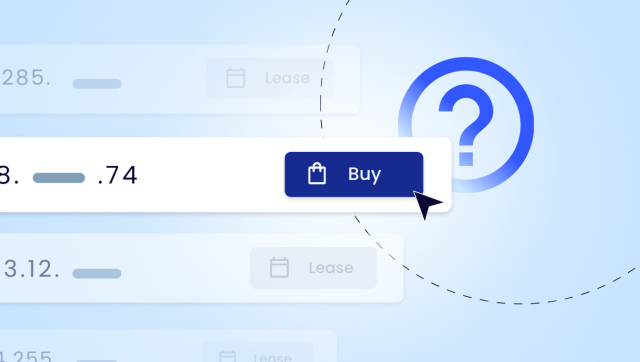The Internet is based on IP addresses to identify devices and facilitate communication. One of the most popular standards in the world is IPv4 (Internet Protocol version 4). There has been a scarcity of IPv4 resources and new business, and hosting companies have not been able to secure new IP addresses. This scarcity has led to a booming secondary IPv4 market like the primary market, where organizations may purchase, sell, or lease an IPv4 address block safely and legally. This guide explains all basic instructions about how to buy IPv4 addresses and smart tips for safe transactions.
Significant Benefit to Buy IPv4 Addresses
The purchase of IPv4 addresses provides a good business case to companies with stable and secure online businesses. Since the world is running out of IPv4 addresses, possessing them gives businesses the advantage of controlling and flexing their networks in the long run. It eliminates the threat of relying on rented addresses and can prevent an increase in the leasing rates.
Owning your own IPv4 resources also adds more value to your company in the digital space and helps with the smooth growth of the business. As more devices and users get increasingly connected each day, the ownership of IPv4 makes your presence on the Internet reliable and trusted. Hence, it is a good idea today to invest in an IPv4 address to secure and make your business solid in the future.
Step-by-Step Process on How to Buy IPv4 Addresses
Step 1: Determine Your IPv4 Needs
First, determine the current as well as future requirements of your organization. This has to be in terms of IP address, depending on the network expansion, number of users, and geographical location of your organization. Calculate the subnet size (e.g.,/24 = 256 IPs) and create a technical justification as is needed by Regional Internet Registries (RIRs).
Step 2: Select a Trustworthy IPv4 Broker
Choose a certified IPv4 broker or a reliable internet trading platform like IPV4 TradeHub. Such experts oversee verification, negotiation, and transfer documentation, thus ensuring transparency as well as minimizing fraud risks. It is always essential to verify that the broker is accredited by referencing the official list of brokers provided by your RIR.
Step 3: Check an IPv4 Address Block
Before you lease IPv4 address, ensure that the block has not had a history of abuse, blacklisting, or routing issues. Trusted brokers conduct Blacklist and WHOIS checks to maintain compliance. Hence, this helps to avoid the arising technical or legal difficulties in the future after purchase.
Step 4: Finish Legal and RIR Documentation
Read all documents that are legal and technical, based on the policies of your RIR (ARIN, RIPE, APNIC, etc.). Place the transfer request with justifiable reasons, contracts, and supporting information. The RIR will examine, endorse, as well as make amendments to the official ownership records.
Step 5: Property Ownership and Transfer
Upon agreement of both parties and RIR approval is obtained, make the payment by using a secure escrow service to secure funds. The RIR modifies its registry database to include the record of your organization as the new owner of IP addresses after receiving payment confirmation.
Major Factors Affecting the IPv4 Pricing Cycle
The market of IPv4 is currently affected by a few significant factors. Smaller blocks of addresses as /24 or /22, tend to be more expensive per IP since they are more popular and manageable. The allocation region is also an issue, since ARIN or RIPE addresses can be of different value, depending on local supply and policy. The significance of reputation is very high – clean IP addresses with no spam or abuse records get better prices.
Meanwhile, overall market dynamics such as IPv6 adoption rate and the world demand cycle have a direct impact on pricing. All these factors combined determine the dynamic cost of obtaining trusted and reliable IP resources as the available pool of IPv4 keeps decreasing.
Helpful Smart Tips for Safe IPv4 Transactions
Whenever you lease IPv4 addresses, always deal with reputable marketplaces or approved brokers. Before signing any deal, carefully verify the documentation on any ownership and transfer. Secure escrow services: this is a way to reduce risk and to protect your payment. Test the IP status and ensure that the addresses are not blacklisted.
Maintain a good account of communications, agreements, and contracts in the process. These are the basic yet crucial measures that can save your investment, avoid fraud, and legal transfer of ownership. Being on guard and keeping up with the events will enable you to develop trust and confidence in any IPv4 transaction.
Outlook of the IPv4 Addresses Market Beyond 2025
Although the world is gradually moving to IPv6, IPv4 addresses will have considerable demand and value. Most organizations, such as ISPs and cloud service providers, continue to use IPv4 to maintain the current networks. This is what makes the second market alive and competitive.
The price can stabilize, and the sealed deals and checked ownership will also be some of the essential aspects. Collaborating with a trusted and tested broker enables companies to acquire quality blocks of IPv4 cheaply and securely. Until the implementation of IPv6 goes universal, IPv4 will remain a valuable digital resource in the connectivity of the world.
Empower Your Network Growth with IPV4 TradeHub!
Looking to buy IPv4 addresses securely, quickly, and affordably? IPV4 TradeHub is your trusted global marketplace for verified IP transfers and leasing. We offer clean IPv4 blocks, expert RIR compliance support, escrow-protected payments, and end-to-end guidance for buyers and sellers. Whether you are an ISP, cloud provider, or enterprise, our platform simplifies every step of your IP acquisition journey.
